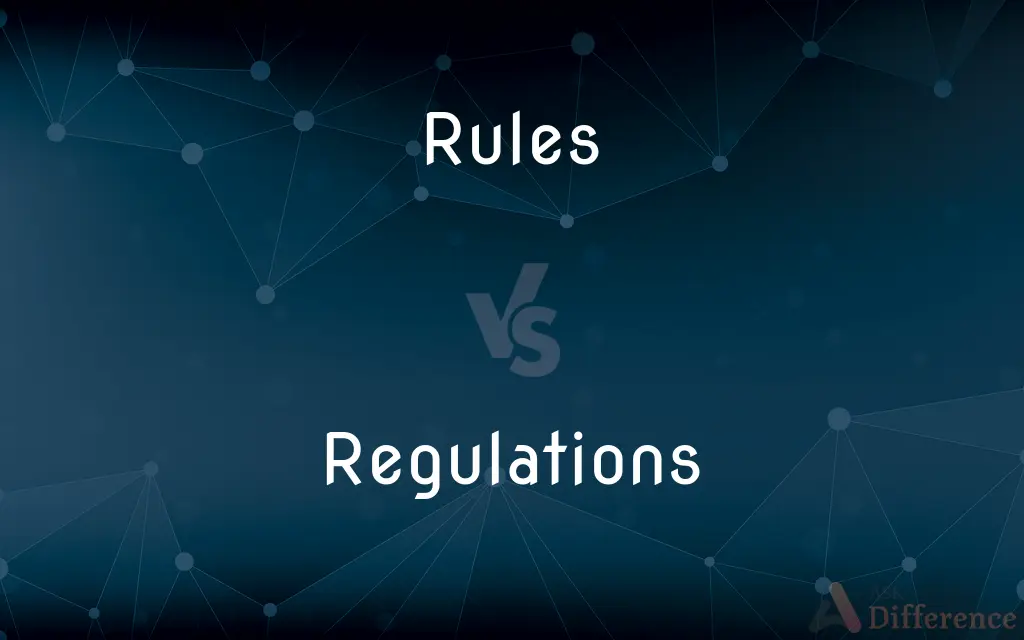Rules vs. Regulations — What's the Difference?
By Tayyaba Rehman & Fiza Rafique — Published on October 9, 2023
Rules: general guidelines or principles. Regulations: specific, detailed directives, often with legal backing.

Difference Between Rules and Regulations
Table of Contents
ADVERTISEMENT
Key Differences
Rules are general guidelines that are set to guide behavior or operations in various contexts. For instance, schools have rules that students should adhere to. On the other hand, regulations are specific directives or statutes set by official bodies, often governmental, to control or govern conduct. For example, environmental agencies might have regulations regarding waste disposal.
In many instances, rules are based on norms or societal expectations. For instance, it's a rule in many households that you don't talk with your mouth full. Regulations, conversely, tend to be more formal and specific. Regulatory bodies, like the Federal Trade Commission, set regulations to ensure businesses operate fairly and transparently.
The realm of rules can be quite broad. It can encompass everything from moral guidelines to organizational best practices. For instance, a company might have a rule that meetings should start on time. Regulations, in contrast, have a narrower scope and often come with legal implications. Regulations in banking, for example, ensure financial institutions maintain certain standards to protect consumers.
Rules can often be flexible, with room for interpretation based on the situation. For example, a rule in a board game might be bent for younger players. Regulations, due to their legal nature, usually have a stricter adherence requirement. Breaking regulations, like those concerning safety standards, can result in legal penalties.
Both rules and regulations are essential in different contexts. Rules can help maintain order and promote expected behaviors, such as the rule of raising one's hand in class before speaking. Regulations ensure there's a standard approach in critical areas, like food safety, to protect the public.
ADVERTISEMENT
Comparison Chart
Nature
General guidelines.
Specific directives with detail.
Origin
Derived from norms or societal expectations.
Set by official bodies, often governmental.
Flexibility
Often more flexible.
Strict due to legal implications.
Implication of Breach
Can vary, not always legal.
Often has legal consequences.
Scope
Broad, varying contexts.
Narrower, specific areas with legal implications.
Compare with Definitions
Rules
Rules: standard procedures or codes guiding behavior.
The club has rules against loud music after 10 pm.
Regulations
Regulations: laws or directives set by authority.
Environmental regulations limit pollution output.
Rules
Rules: established guidelines within a system or game.
The rules of chess dictate how each piece moves.
Regulations
Regulations: binding edicts governing specific practices.
Health regulations ensure restaurants maintain cleanliness.
Rules
Rules: norms based on societal expectations.
It's a rule to say please and thank you.
Regulations
Regulations: official standards with legal consequences.
Building regulations dictate construction standards.
Rules
Rules: directives that delineate correct practices.
The library has rules about returning books on time.
Regulations
Regulations: statutory requirements within industries.
Financial regulations protect consumers from fraud.
Rules
Governing power or its possession or use; authority.
Regulations
Regulations: rules with formal authority behind them.
Zoning regulations determine land use in cities.
Rules
The duration of such power.
Regulations
The act of regulating or the state of being regulated.
Rules
An authoritative, prescribed direction for conduct, especially one of the regulations governing procedure in a legislative body or a regulation observed by the players in a game, sport, or contest.
Regulations
A principle, rule, or law designed to control or govern conduct.
Rules
The body of regulations prescribed by the founder of a religious order for governing the conduct of its members.
Regulations
A governmental order having the force of law. Also called executive order.
Rules
A usual, customary, or generalized course of action or behavior
"The rule of life in the defense bar ordinarily is to go along and get along" (Scott Turow).
Regulations
(Embryology) The capacity of an embryo to continue normal development following injury to or alteration of a structure.
Rules
A generalized statement that describes what is true in most or all cases
In this office, hard work is the rule, not the exception.
Regulations
(Sports) The standard playing period for a timed game, prior to overtime or a shootout.
Rules
(Mathematics) A standard method or procedure for solving a class of problems.
Regulations
Plural of regulation
Rules
A court decision serving as a precedent for subsequent cases
The Miranda rule.
Rules
A legal doctrine or principle.
Rules
A court order.
Rules
A minor regulation or law.
Rules
A statute or regulation governing the court process
Rule of procedure.
Rule of evidence.
Rules
See ruler.
Rules
(Printing) A thin metal strip of various widths and designs, used to print borders or lines, as between columns.
Rules
To exercise control, dominion, or direction over; govern
Rule a kingdom.
Rules
To have a powerful influence over; dominate
"Many found the lanky westerner naive, and supposed that he would be ruled by one of his more commanding cabinet officers" (William Marvel).
Rules
To be a preeminent or dominant factor in
"It was a place where ... middle-class life was ruled by a hankering for all things foreign" (Amitav Ghosh).
Rules
To decide or declare authoritatively or judicially; decree
The judges ruled that the answer was acceptable. The police ruled the death a homicide. The law was ruled unconstitutional.
Rules
To mark with straight parallel lines.
Rules
To mark (a straight line), as with a ruler.
Rules
To be in total control or command; exercise supreme authority.
Rules
To formulate and issue a decree or decision.
Rules
To prevail at a particular level or rate
Prices ruled low.
Rules
(Slang) To be excellent or superior
That new video game rules!.
Rules
Plural of rule
Rules
Rules: principles governing conduct.
Basic traffic rules ensure road safety.
Common Curiosities
Can a rule become a regulation?
Yes, if a rule is formally adopted by a governing body and given legal backing, it can become a regulation.
What's the core difference between rules and regulations?
Rules are general guidelines, while regulations are specific directives, often with legal authority.
Who usually sets regulations?
Regulations are often set by governmental or official bodies.
Why are regulations important in industries?
Regulations ensure standardization, safety, fairness, and protection of consumers and stakeholders.
Which is broader in scope, rules or regulations?
Rules generally have a broader scope, while regulations are more specific and detailed.
Are rules always less strict than regulations?
Not necessarily. Some rules can be stringent, but regulations often have legal consequences, making them stricter in that context.
Can a rule have legal backing like a regulation?
Yes, but while rules can be legal, not all are, whereas regulations typically have legal force.
Can organizations have their own regulations?
Organizations can have strict rules, but "regulations" typically refer to directives from external governing authorities.
Are regulations only about restrictions?
No, regulations can also outline rights, set standards, or clarify responsibilities.
Can you give an example of a societal rule?
A societal rule might be to wait in line without pushing ahead.
Do all countries have similar regulations?
No, regulations can vary widely between countries, especially in areas like business, health, and environment.
Which is more important, rules or regulations?
Both are important in different contexts. Rules guide general behavior, while regulations ensure compliance in specific areas.
Is every regulation legally binding?
Most regulations are legally binding, especially when set by governmental bodies.
How do rules differ in games and society?
While both provide guidelines, game rules dictate gameplay, while societal rules guide behavior based on norms.
Are regulations permanent?
Regulations can be changed, amended, or repealed by the respective governing body.
Share Your Discovery

Previous Comparison
Histogram vs. Bar Graph
Next Comparison
Normal Goods vs. Inferior GoodsAuthor Spotlight
Written by
Tayyaba RehmanTayyaba Rehman is a distinguished writer, currently serving as a primary contributor to askdifference.com. As a researcher in semantics and etymology, Tayyaba's passion for the complexity of languages and their distinctions has found a perfect home on the platform. Tayyaba delves into the intricacies of language, distinguishing between commonly confused words and phrases, thereby providing clarity for readers worldwide.
Co-written by
Fiza RafiqueFiza Rafique is a skilled content writer at AskDifference.com, where she meticulously refines and enhances written pieces. Drawing from her vast editorial expertise, Fiza ensures clarity, accuracy, and precision in every article. Passionate about language, she continually seeks to elevate the quality of content for readers worldwide.












































